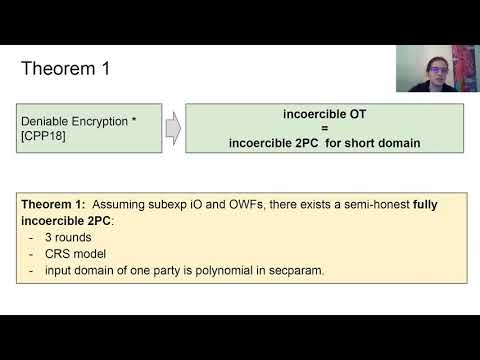CryptoDB
Towards Multiparty Computation Withstanding Coercion of All Parties
| Authors: | |
|---|---|
| Download: | |
| Abstract: | Incoercible multi-party computation [Canetti-Gennaro ’96] allows parties to engage in secure computation with the additional guarantee that the public transcript of the computation cannot be used by a coercive external entity to verify representations made by the parties regarding their inputs to and outputs from the computation. That is, any deductions regarding the truthfulness of such representations made by the parties could be made even without access to the public transcript. To date, all incoercible secure computation protocols withstand coercion of only a fraction of the parties, or else assume that all parties use an execution environment that makes some crucial parts of their local states physically inaccessible even to themselves. We consider, for the first time, the setting where all parties are coerced, and the coercer expects to see the entire history of the computation.In this setting we construct: - A general multi-party computation protocol that withstands coercion of all parties, as long as none of the coerced parties cooperates with the coercer, namely they all use the prescribed ``faking algorithm'' upon coercion. We refer to this case as cooperative incoercibility. The protocol uses deniable encryption and indistiguishability obfuscation, and takes 4 rounds of communication. - A general two-party computation protocol that withstands even the ``mixed'' case where some of the coerced parties cooperate with the coercer and disclose their true local states. This protocol is limited to computing functions where the input of one of the parties is taken from a small (poly-size) domain. This protocol uses deniable encryption with public deniability for one of the parties; when instantiated using the deniable encryption of Canetti, Park, and Poburinnaya [Crypto'20], it takes 3 rounds of communication. Finally, we show that protocols with certain communication pattern cannot be incoercible, even in a weaker setting where only some parties are coerced. |
Video from TCC 2020
BibTeX
@article{tcc-2020-30636,
title={Towards Multiparty Computation Withstanding Coercion of All Parties},
booktitle={Theory of Cryptography},
publisher={Springer},
author={Ran Canetti and Oxana Poburinnaya},
year=2020
}

